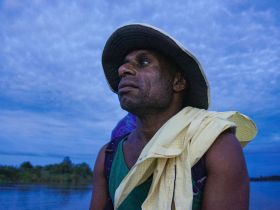First steps into the real world. Image: Hound, a student film by Georgia Kriss. The whole film is available here.
The Filmmaker Development Day at the St Kilda Film Festival left us wondering whether you need to go to film school.
Meanwhile, RMIT was running a session in which four recent graduates described how they grabbed those key first successes after film school.
Lisa French, Professor and Deputy Dean (Media) at the School of Media and Communications at RMIT sorted through their observations.
—
Writer and occasional film producer Graeme Simsion was hot off a plane from Hollywood where his novel The Rosie Project has been optioned by Sony Pictures.
Producer, writer and director Olivia Peniston-Bird, whose debut documentary feature Graceful Girls won the 2015 MIFF People’s Choice Best Documentary Award, has had her head down on Channel 10’s popular reality television series Gogglebox.
Animator and illustrator Georgia Kriss whose film Hound won Best Australian Film at the 2016 Melbourne International Animation Festival has been working on children’s television at Bogan Studios.
And Julian Lucas, whose short Granny Smith won ‘Best Film’ at Tropfest in 2014 has just finished a web series whilst running and working in his own production company (Wildebeest).
So, with experience that includes shorts, documentary, animation, features, branded content and the web series – how did they navigate that journey from film school into the real world?
Graeme Simsion had quite a history before he studied Screenwriting as well as Professional Writing and Editing. He said he learnt theory, practice, industry knowledge, and got feedback on work, connected with potential collaborators and undertook industry engaged practice that was ‘aligned to what you have to do in the real world’. He said, ‘You can get all of those things without going to RMIT but boy it’s a hard way to do it. RMIT structures it for you’. Simsion used every talk, every guest speaker, and every source of help as resources to think about the project he was developing.
Many industry stories recall how important collaborators met during their studies. Julian Lucas met his key creative collaborator during his course. James Wan and Leigh Whannell met in their RMIT Media course where they watched the first Mad Max film, which inspired them on Saw.
Simsion described a screenplay as ‘an invitation to collaborate’, which he says is very different to novel writing. In his experience, it is much easier to write a screenplay than it is to write a novel but it is ‘far, far easier to get a book published than to get a film up’. He says that thousands of books are published every year and not nearly as many films. Once you have a best seller, you can secure more publishers and getting published anyway is a much easier pathway than filmmaking.
His dream was to go straight to Hollywood but he now thinks that probably was not possible as a first time screenwriter – but he says, there is a pathway for an unknown via novel writing. Novel writing turned out to be a pathway for Rosalie Ham, who did Professional Writing and a Master of Creative Writing at RMIT and wrote The Dressmaker—a film produced by RMIT Adjunct Professor and Screen Producer Sue Maslin.
Here are the ten top tips offered by this St Kilda Film Festival panel:
1. Getting into your dream course: keep applying, applicants often succeed the second time around. This demonstrates tenacity, which is something you need in the industry (and selectors look favourably on it).
2. Take this tenacity with you out into the industry. Consider taking a gamble and bravely pushing yourself forward – Peniston-Bird went to Spain when she heard Sexy Beast (Jonathan Glazer, 2000) was in production and ended up getting a gig (and a credit) as third assistant director.
3. Just do it – get out there and make things and develop a portfolio. Simsion, reflecting on the maverick spirit just went out and made a no budget film – he backed himself by four walling it for screenings at the Kino and he learnt a lot whilst increasing his confidence.
4. Make the most of your university time. There is more you can do and create by using the university resources and participating – Peniston-Bird was on the student newspaper and student radio. (RMIT has on campus student newspapers, radio SynFM, and community television RMITV and Channel 31. The university is about to open a new media precinct that includes four (4K) television studios amongst facilities students can make the most of).
5. Don’t under-estimate the value of volunteering or internships because they often turn into work and networks (courses have internships as a requirement anyway, but this is a chance to show what you can do, get work, and try out an area to see if it suits you. But choose carefully as people often end up in the sector they started in).
6. Participate in screen culture activities to broaden your networks and even show your work (which can lead to employment). Georgia Kriss showed her animations at LoopdeLoop where she met her tribe and got offered work.
7. Seek help when you need it, including mentors. Students have a lot of access as industry people generously give advice – so don’t be shy.
8. When you finish, you might do another course. Lucas for example did a Media degree and then a shorter VE (TAFE) course in screenwriting – so there are lots of ways to structure what you study according to your own needs. TAFE courses are accredited pathways into degree courses but it can be done the other way around.
9. As you go into the industry, Lucas says ‘don’t be proud’, get skills in any field of the industry that you can and don’t get bogged down in the idea that some areas are the peak ones – because the important thing is to get skills and experiment.
10. You need to have some work that can sustain you as industry work is often full on, or there isn’t any work, so having a way to earn money as well is strategic – as is having several skills that maximize career opportunities.
And for those who had been rejected from St Kilda or other festivals, take heart and just keep going. Graeme Simsion noted that ‘every film finds its festival’, – so you just need to find yours!
More on that film school question: Vimeo selection – watch the shorts shown at St Kilda.





